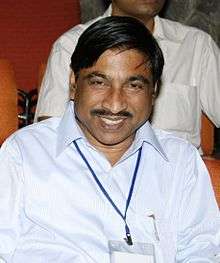K. K. Muhammed
Karingamannu Kuzhiyil Muhammed (born 1 July 1952) is an Indian archaeologist. He was the Regional Director (North) of the Archaeological Survey of India (ASI), and also served as the Project Archaeological Director in the Aga Khan Trust for Culture from 2013 to 2016. He was honored with India's civilian honor Padma Shri[1] in 2019 by President Ram Nath Kovind.
Muhammed K K | |
|---|---|
 | |
| Regional Director (North), Archaeological Survey of India | |
| In office 2012–2012 | |
| Preceded by | Position established |
| Succeeded by | Dr. D. N. Dimri |
| Superintending Archaeologist, Archaeological Survey of India | |
| Offices Held | Delhi (2008-2012), Bhopal (2004-2008), Chhattisgarh (2003-2004), Agra (2001-2003), Patna (1997-2001) |
| Dy. Superintending Archaeologist, Archaeological Survey of India | |
| Offices Held | Goa (1991-1997), Madras (1988-1990) |
| Personal details | |
| Born | 1 July 1952 Calicut, Kerala |
| Nationality | Indian |
| Spouse(s) | Rabiya Muhammad |
| Children | Jamshedh Muhammed, Shaheen Muhammed |
| Residence | Calicut, Kerala |
| Alma mater | Aligarh Muslim University |
| Awards | Padma Shri (2019) |
Early life and education
KK Muhammed was born in Calicut, Kerala in a middle-class family to Beeran Kutty Haji and Mariyam. Muhammed is second amongst five siblings. After completing his schooling from Government Higher secondary School, Koduvally, he obtained his master's degree in history (1973–75) from Aligarh Muslim University and his postgraduate diploma in archaeology (1976–77) from the School of Archaeology, Archaeological Survey of India, New Delhi, India.
Career
Muhammed served as technical assistant and then as assistant archaeologist in the Department of History at Aligarh Muslim University. He was later selected as deputy superintendent archaeologist in Archaeological Survey of India.
Muhammed was initially posted at Madras in 1988 and later transferred to Goa in 1991. In 1997, Muhammed was promoted as superintendent archaeologist and subsequently, served in Bihar, Uttar Pradesh, Chhattisgarh, Madhya Pradesh and Delhi.
During this period, he also served as a tour guide to historic monuments for prominent foreign guests such as Pervez Musharraf and Barack Obama.[2] In 2012, Muhammed Retired as regional director (north) from Archaeological Survey of India.
Major archaeological discoveries
- Excavated Ibadat Khana, the structure where Akbar proclaimed the formation of Composite religion known as Din-e Ilahi (Nursery of Indian Secularism)
- Discovered the first Christian Chapel of North India built by Akbar at Fatehpur Sikri
- Excavated the Buddhist Stupa of Kesaria built by Emperor Ashoka[3]
- Discovered and excavated Buddhist Stupa in Rajgir
- Excavated the Buddhist archaeological site in Kolhua, Vaishali
- Located and Excavated a number of rock cut caves, Umbrella Stones, Cists and Dolmens in Calicut and Malapuram districts of Kerala
Dantewada temples
KK Muhammed conserved the Barsoor and Samlur Temples in Dantewada District near Jagdalpur, Chhattisgarh. This area is known to be the seat of Naxal activities in the region. In 2003, KK Muhammed was able to convince Naxal activists and with their co-operation, conserved the Temples to its present-day state.
Bateshwar Complex restoration
Bateshwar, Morena is a complex of 200 ancient Shiva & Vishnu temples situated 40 kms away from Gwalior. These temples were built between 9th and 11th century during the Gurjara-Pratihara Dynasty, 200 years before Khajuraho. The area was under the control of Nirbhay Singh Gujjar and Gadariya Dacoits. KK Muhammed was successful in convincing the dacoits to let him restore these temples. He was able to restore 60 temples during his tenure. After the dacoits were eliminated by the police, the area was encroached by the mining mafia.[4][5][6]
Facelift of Delhi's monuments
KK Muhammed was appointed as the Superintending Archaeologist of Delhi Circle, Archaeological Survey of India in 2008. His primary task was to carry out a major facelift activity at 46 monuments for the Commonwealth Games of 2010.
Museum - Masterpieces of Indian Art
KK Muhammed conceived and executed the idea of building a Museum that contains the replicas of statues and stone carved sculptures across India. The museum, popularly known as the Replica Museum or the Children Museum is situated outside the Siri Fort Sports Complex, behind Siri Fort Auditorium in Delhi.[7][8][9]
Autobiography
In 2016, KK Muhammad's Malayalam-language autobiography Njan Enna Bharatiyan ("I am Indian") was released. The book attracted controversy due to his claim that the Marxist historians sided with the extremist Muslim groups and derailed attempts to find an amicable solution to the Ayodhya dispute. According to him, archaeological excavations at Ayodhya clearly indicated the presence of a temple below the mosque, but the leftist historians dismissed these, and even tried to mislead the Allahabad High Court.[10][11]
References
- "2019 Awardees List".
- Mission Conservation
- "A Discourse By Ace Archaeologist Mr KK Muhammed". Blogspot.com.
- "Man of Monuments". The Hindu.
- "The Temple Guardian". The Hindu.
- "Guest Lecture Series at Nalanda". Nalanda University Blog.
- "Museum of Mirrors". The Indian Express.
- "Replica Museum at Siri Fort". India Video.
- "Replica Museum in Delhi crafted by Patna artists". The Times of India.
- KA Antony (21 January 2016). "Left historians connived with extremists, mislead Muslims on Babri issue, says archaeologist in new book". Firstpost.
- Singh, Varun (11 May 2017). "Muslims misled over Ayodhya, says KK Mohammed". The Asian Age. Retrieved 21 November 2019.
External links
- Digger of truth: K. K. Muhammad by A.J. Philio
- Young Indians